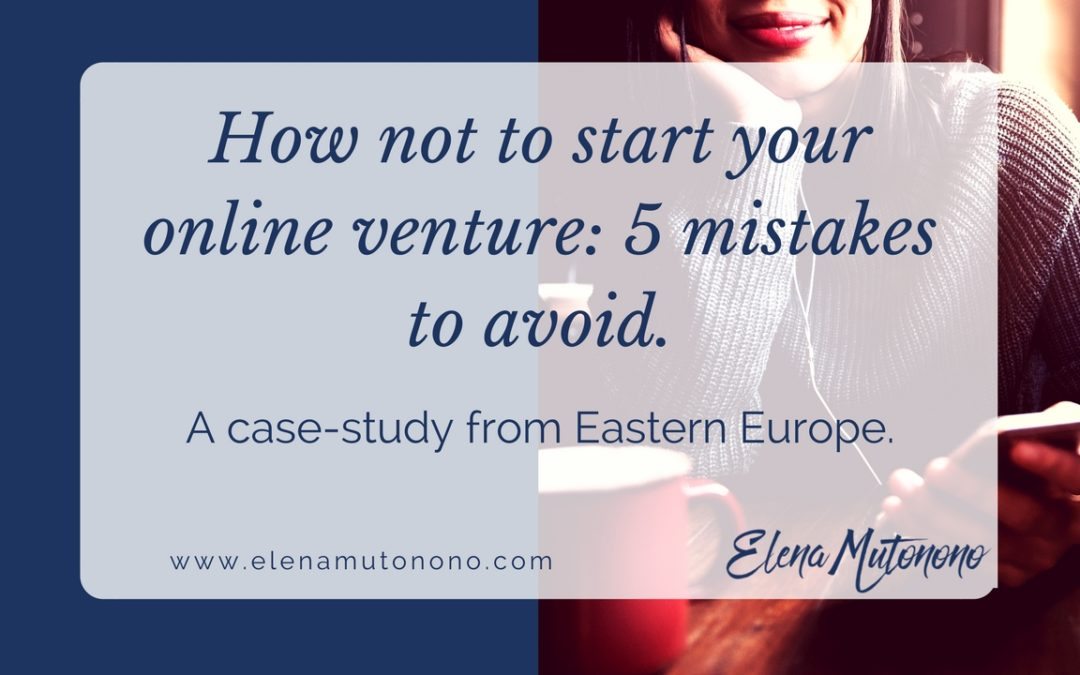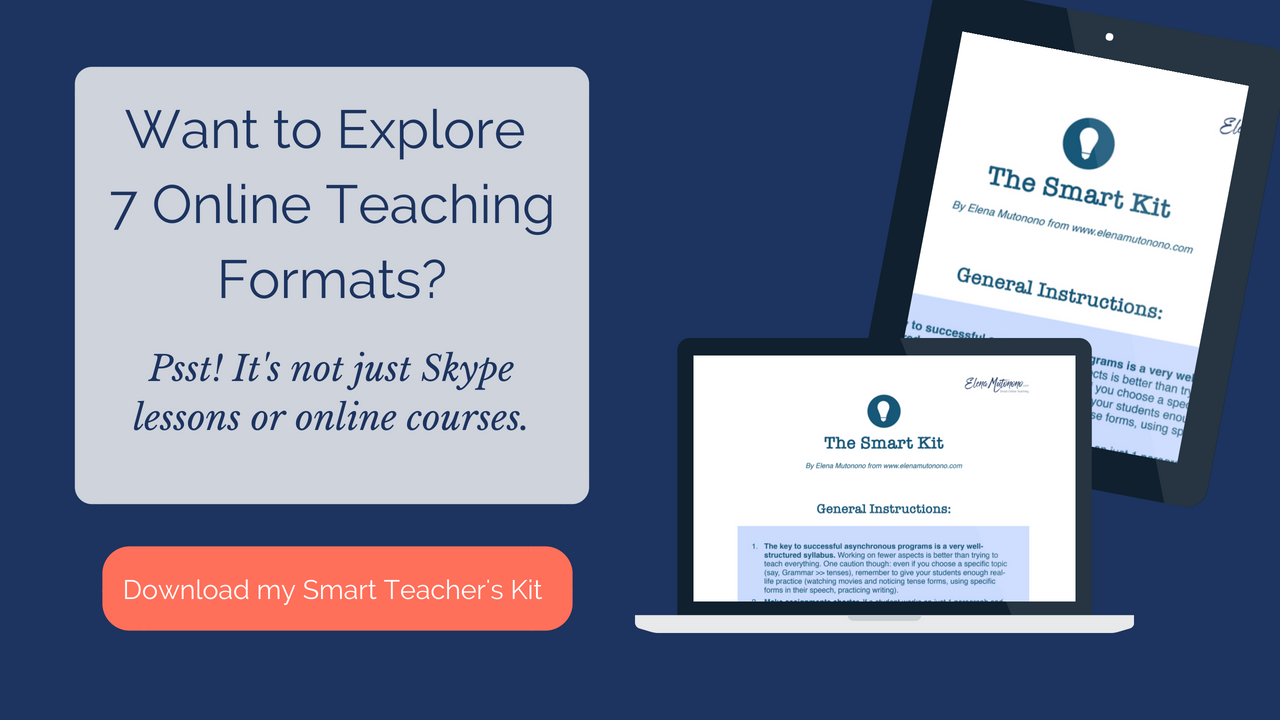Just like any teacher, I get particularly stoked when I find out that one of my former students (who is also a teacher nowadays) is attempting to start an online venture. It has been over 12 years since I last saw this student in my class, and now – what an amazing transformation! She’s attempting to give an online school a go.
I’ve been privileged to take a look at her website and can tell you that I’m very impressed.
As a person who’s been navigating online teacherpreneurship for 5 years I was also inspired to do a basic informal analysis/case-study of her online venture so you, too, can learn from this.
The owner, let’s call her Anna, is still at the beginning stages of the project and wants to keep a low profile. Hence I’m keeping some identifying information private.
In this post I’m going to give some background and description of the services her online venture provides, and then dive into the analysis itself which, I do hope, is going to combine positive and constructive criticism.
The Background.
Anna is a native Ukrainian, and her online school mainly caters to the Russian/Ukrainian-speaking students who would like to learn foreign languages (English primarily, but also a few others).
She offers all of the services online, the services include private language lessons via skype for adults mainly, access to free materials (not all original, but those available on youtube and in public domain), and blog posts.
Description of the school.
From the description of the platform I discovered that it has been in existence for a few months, but has already gained some traction on social media websites and has been featured on one of the news websites as an “innovative language learning through skype.”
The school offers 4 languages (English, German, French and Spanish), a variety of courses (general, professional and exam preparation) taught by young specialists (although some have over 5 years classroom teaching experience) at an extremely affordable price.
Now I will be getting into a few details about the school as a business venture, something that ESL teachers are never taught and usually learn through a series of personal “discoveries.”
The amazing thing is that while I know without a shadow of a doubt that Anna is dedicated and persevering, and she will choose her teachers carefully and train them well, there are a lot of other factors that make an online venture a success.
If she sticks with it long enough, she will, later rather than sooner, so in an attempt to help her out, here’re my 5 tips (with her permission).
5 Tips to Make your Online Venture a Success.
#1: Find somebody’s business/website/online venture that you really like and try to emulate them, not your peers.
When teachers launch an online business (whether or not they’re familiar with the idea of niche-finding) they usually look at what else is out there around them. There aren’t many online-only schools in Ukraine (yet), and that is a great benefit that Anna can certainly use to her advantage.
As a rule, at a point of launching something “innovative” (although skype lessons are far from being innovative, but again in some countries they are!) the budding teacherpreneurs compare themselves to what’s around them, analyze it and then build on it, adding one or two competitive features.
In Anna’s case there are two: young specialists (older students aren’t always computer-savvy, so the school attracts younger students and motivates them by the possibility of learning from younger teachers) and low prices ($10 an hour).
These two features may look good in the beginning, but unless they change (and change quickly), the school will no longer be treated seriously, and the expense of running it will spike.
So if you set out to start an online school, look beyond your immediate competition, look at the people you don’t think you’re ever going to match up to, then you’ll grow and become like them. It’s common to be afraid to dream big, but dreams are powerful if we don’t shun them.
#2: Start Small.
So the first 2 things I always look at whenever I go to any of these online school websites are a) what they offer (and how many things they offer), and b) how large is their staff.
Anna’s business has been in existence for a few months, but they already offer 4 languages (different packages, mind you, not just “conversation”) and they feature half a dozen of teachers. Again, this comes from our observations, not so much from the experience of running a business.
When we look around, we see schools with 20-25 teachers, 2 administrative staff offering 10 languages, etc. What usually happens in schools like these are communication glitches. The staff may not know the teachers well, the teachers depend on the staff to put together their curriculum, the web designers are doing their own thing, etc., etc.
That will eventually lower the morale, the quality of instruction, and reputation. Keep in mind though that we’re looking at a case study from Ukraine where a language school starts out offering at least 5 languages.
But what if we begin with just 1 or 2 and develop them to a point where teachers and administrators know what everyone else is doing before we add one more language and one more teacher? I can hear people say, “Yes, but that means we’re not going to be making as much money from the get-go.”
But the goal is to increase viability of any venture gradually, not decrease it. When we start big (and charge too little) somebody is definitely going to get underpaid and then question the whole idea of having a school in the first place. Start with one or two languages, one or two teachers, one or two programs, do them well, increase your revenue, then grow.
#3: Personalize your website.
This is of course impossible for Anna at the moment, but I do hope that it is a temporary phase. Whenever I look at anybody’s website, I want to connect to their owner. I have questions like, “How did he decide to teach online? What prompted him to start these courses? How long did it take him to create these materials?”, etc.
I would even be bold enough to say that through such personalizing on the “about me” page I’d like to know the school owner personally, even though understandably I will read only limited information about them. Let your website speak for you.
For instance, two weeks ago I attended Kerstin Cable’s webinar on personal branding, and she shared a few things about herself.
She shared why she switched to online language teaching, materials writing, teacherpreneurship and coaching, having left behind a very secure position at a prestigious University. Her story resonated with mine, and there was this emotional bond immediately that prompted me to enroll in her course.
It is this personal story that matters to people because they are not only looking to solve their problem, but they’re also looking to connect.
Most of my students have been working with me online off and on for over 3 years, and they don’t want to keep looking, they know not just the fact that I’m a teacher, but they know much more about me, and they want to continue working with me.
Want to start your own #online #school? Check out this case study to avoid 5 common faux pas.Click To Tweet
#4: Set Fair Price.
Most schools offer lower prices (and 20% package discounts!) to attract customers, but running a business requires some overhead costs (though they might be much less than actually opening up a brick-and-mortar school), investment, promotion and a rainy-day fund.
It is possible to charge a small fee when you’re the only teacher, administrator, promoter, blogger, and web-designer, but even as you begin to grow you will delegate some of these responsibilities, and those need to be compensated.
A few years ago I trained two young teachers who told me that they were hesitant to charge a lot because then people couldn’t afford their lessons. This of course is a vicious circle.
You charge little, you get low-paying students, you work a lot (or start cutting corners), you have no money to invest into continued education, therefore you can’t raise your fees, you can’t attract better clients, and eventually you’re burned out. I’m not saying that you should over-charge.
But the price must be fair, even if what you’re doing is a “side-business” (if there’s ever such a thing). Look at the value that you’re offering.
#5: Develop your Own Content.
The absence of your own, unique content damages your brand in the long run.
Do you want to offer something unique (no problem with using some other materials, if properly referenced), some know-how that only you could have come up with and share it with your audience? This is what they are going to pay you money for.
It is rare to have it all together when you’re just starting out, and Anna is adding her own materials as she grows her database, but it’s important to keep in mind that student retention and their interest has to come from what you and only you can offer.
So, blog consistently. Write materials. Record podcasts and video lessons to widen your net of prospects and grow your clientele.
When you are starting out, there are so many things that you need to be aware of, and many of them will come as you keep trying out different things.
Finding a niche is a long process, but it can be broken-down in small steps and can make you stand out sooner than you think. Dream big, start small. Work consistently at putting together new materials and retaining your clientele.
Be personal and authentic, and they will connect with you not because of what you offer, but because of who you are. And always – enjoy the ride!




 Welcome to my nook where *Big Magic* happens. My name is Elena Mutonono, I help small business owners package their services as digital products and sell them online. I want you to work smarter, not harder. Increase your impact beyond your current face-to-face clients. Grow your business as you reach more people all over the world.
Welcome to my nook where *Big Magic* happens. My name is Elena Mutonono, I help small business owners package their services as digital products and sell them online. I want you to work smarter, not harder. Increase your impact beyond your current face-to-face clients. Grow your business as you reach more people all over the world.








“Keep in mind though that we’re looking at a case study from Ukraine where a language school starts out offering at least 5 languages.”
Can’t quite agree with that. I know quite a few large language schools in Ukraine that offer one language only. I myself have worked in three of them. I would say that it is a rare thing here for a school to offer several languages.
Ah, thanks! This is helpful. As you notice, I wrote this over 5 years ago, so I’m glad to see that things are changing! But back then, that was a real case and a real school. But we don’t have to go far — the self-employed teachers often teach everything, although that is changing. About 2-3 years ago when we were presenting at summits about niching down, it was a foreign concept. Now everyone understands that it’s the only way to grow your business.